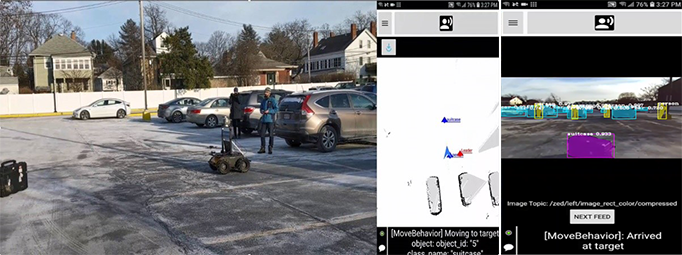Charles River Analytics Inc., developer of intelligent systems solutions, has developed a hands-free human-machine interface (HMI)—Supervisory HMI Enabling Practical Autonomous Robot Direction (SHEPARD). With SHEPARD, US Army Commanders can issue instructions to unmanned vehicles (UxVs) using natural human gestures and intuitive interactions with smart devices. By fusing multiple, proven robot control technologies, SHEPARD allows robotic platforms to become true support agents.
“Our approach to managing UxVs is in stark contrast with how robot operators currently direct unmanned platforms—they use cumbersome, hands-on, head-down controllers,” said Camille Monnier, Principal Scientist at Charles River Analytics and Principal Investigator on the SHEPARD effort. “Our goal with SHEPARD is to develop controls that let robots seamlessly integrate into human teams.”
At Charles River Analytics, our deep understanding of applied robotics and autonomy is the result of extensive research, development, and deployment of solutions incorporating disciplines such as artificial intelligence (AI), machine learning, cognitive science, and human factors. This experience uniquely positions us to provide mature and tailored solutions for our customers’ needs.
Learn more about SHEPARD at the Association for Unmanned Vehicle Systems International (AUVSI) XPONENTIAL 2019—the world’s largest tradeshow for unmanned and autonomous systems—from April 29-May 2 in Chicago, IL. AUVSI represents corporations and professionals from more than 60 countries involved in industry, government, and academia.
Read about our other Unmanned Systems capabilities.
Learn More About How We Translate New AI Ideas into Actionable Solutions at AUVXI XPONENTIAL!
Talk to us about SHEPARD at the Association for Unmanned Vehicle Systems International (AUVSI) XPONENTIAL 2019—the world’s largest tradeshow for unmanned and autonomous systems—from April 29-May 2 in Chicago, IL. AUVSI represents corporations and professionals from more than 60 countries involved in industry, government, and academia.





